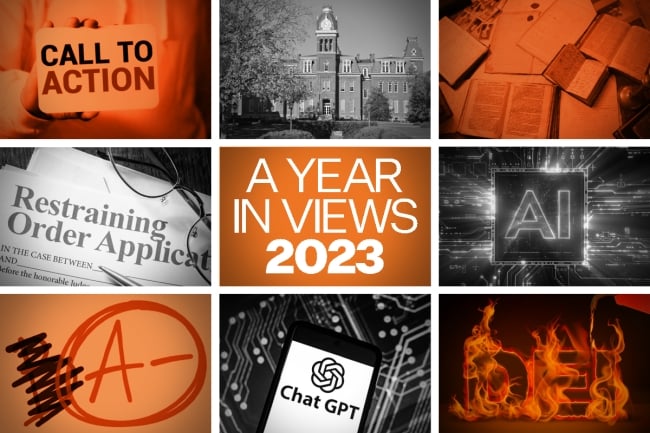You have /5 articles left.
Sign up for a free account or log in.

Photo illustration by Justin Morrison/Inside Higher Ed | Getty Images | Pixabay
In case you missed it, as they say.
As higher ed largely closes down for the holiday season, take a moment to catch up on any or all of these opinion essays that were among the most widely read by Inside Higher Ed readers over the past year—we’ve collected a dozen (no, a baker’s dozen) pieces for you here.
Not surprisingly, threats to higher education, its autonomy and its integrity were top of mind for many of our authors and readers. Chief among these threats were state-by-state attacks on diversity, equity and inclusion programs and “divisive topics” in the classroom, legislative proposals to end or undermine tenure, and continuing cuts to the teaching and research infrastructure for the humanities and other liberal arts fields, as well as literal threats to physical safety.
Readers and authors also grappled in these pages with urgent questions about the impact of ChatGPT and other artificial intelligence programs on the curriculum and the workforce.
Other pieces collected here speak variously to pressing issues around access and rigor, faculty working conditions, student disengagement, antisemitism and free speech, and the corporatization of the academy.
It's been quite a year. Rest up; eat some cookies. See you here in 2024.
“A Liberal Education in Name Only”: Surveying program cuts at West Virginia University, Marymount University and elsewhere, Christopher A. Snyder argues that colleges that decimate their departments and disciplines should not claim to offer a liberal arts education.
“A Tenured Professor’s Call to Arms”: Higher ed is under threat, and tenured full professors must defend it, Mathew H. Gendle writes. “No hero will be swooping in to support our institutions—we must take on that responsibility to do this hard (and sometimes painful and personally detrimental) work ourselves.”
“4 Ways Universities Gaslight DEI Initiatives”: The authors—Megan MacKenzie, Özlem Sensoy, Genevieve Fuji Johnson, Nathalie Sinclair and Laurel Weldon—identify four strategies universities use to gaslight and resist the DEI efforts they claim to champion.
“Does Humanities Research Still Matter?”: Ticking through the long list of fellowships that have been shuttered in recent years, Asheesh Kapur Siddique argues that the rapid collapse in research funding is one crisis in the humanities that gets far too little attention.
“Education as Privilege Laundering”: In favoring students from affluent backgrounds, elite colleges practice a kind of magic, turning money into merit, Musa al-Gharbi writes. Such “privilege-laundering schemes … are the rule, perhaps even the telos, of the American educational system.”
“Walking Faculty Back From the Cliff”: Drawing on their original survey research, Sean McCandless, Bruce McDonald and Sara Rinfret warn that “burnout is a critical concern for the academy.” Among their findings, 40 percent of faculty they surveyed said they “often” or “always” feel worn-out.
“Amy Gutmann’s $23 Million and the Triumph of Cynicism”: No president deserves $23 million, Jonathan Zimmerman writes of the former University of Pennsylvania president’s pay in 2021 (about $20 million of which was deferred compensation). Where, Zimmerman asks, is the outrage?
“When Faculty Face Violent Threats”: On a Tuesday evening in 2019, police came to Adam S. Ward’s door and told him a former student wanted to kill him and his family. Ward reflects on what happened after, with an eye toward helping other faculty and urging colleges to improve their support systems.
“When Commitments to Free Speech and Against Antisemitism Collide”: As conflicts between these values increasingly arise on campuses, Jeffrey Herbst argues that college leaders should be asking different, tougher questions, including “whether antisemitism is being handled differently than other hatreds.”
“Behind Declining Standards in Higher Ed”: A “broke-woke-stroke” convergence–corporatization combined with “woke” sensibilities of faculty and administrators and student entitlement and fragility–may be to blame for decreasing rigor, Mark Horowitz, Anthony L. Haynor and Kenneth Kickham write.
“Students Are Less Engaged: Stop Blaming COVID”: Jenny Darroch argues it’s past time to stop blaming the pandemic for students’ disengagement and instead adapt instruction to account for the different ways this generation of students prefers to learn.
“In Battle for Tenure, Words Matter”: Terms like “job for life” and "permanent position" imply that tenure is categorically different than other forms of just-cause employment—but it’s not, writes Deepa Das Acevedo. Academics should work to counter this “powerful, misguided and misleading rhetoric … at every opportunity.”
ChatGPT, a mini-compendium: we’re cheating here (how appropriate) in counting all these essays on AI as one entry, but 2023 was after all the year of the ch(e)at bot in higher education. In “Yes, We Are in a (ChatGPT) Crisis,” Inara Scott writes that colleges must urgently confront the “tidal wave” of AI-generated assignments even as they fundamentally rethink their curricula.
Speaking of rethinking curricula, Melissa Nicolas argues that colleges can “Eliminate the Required First-Year Writing Course” now that AI can complete many of the tasks that professors outside writing programs want such a course to teach. (For an alternative view, see Mandy Olejnik’s rebuttal, “AI Won’t Replace Writing Instruction.”)
Meanwhile, Jennie Young argues that AI will actually be a boon for first-year writing instruction in “Why I’m Excited About ChatGPT.”
Finally, in other popular “View” essays about the impact of AI, Jonathan Alexander stands up for “Students’ Right to Write” in an AI era; Molly Vollman Makris, Nate Mickelson and Ryan Coughlan recommit to three pedagogical practices with an eye toward “Readying Students for the AI Revolution”; and Barbara Fister and Alison J. Head look at ChatGPT through the lens of what higher ed got wrong about Wikipedia in their essay “Getting a Grip on ChatGPT.”








